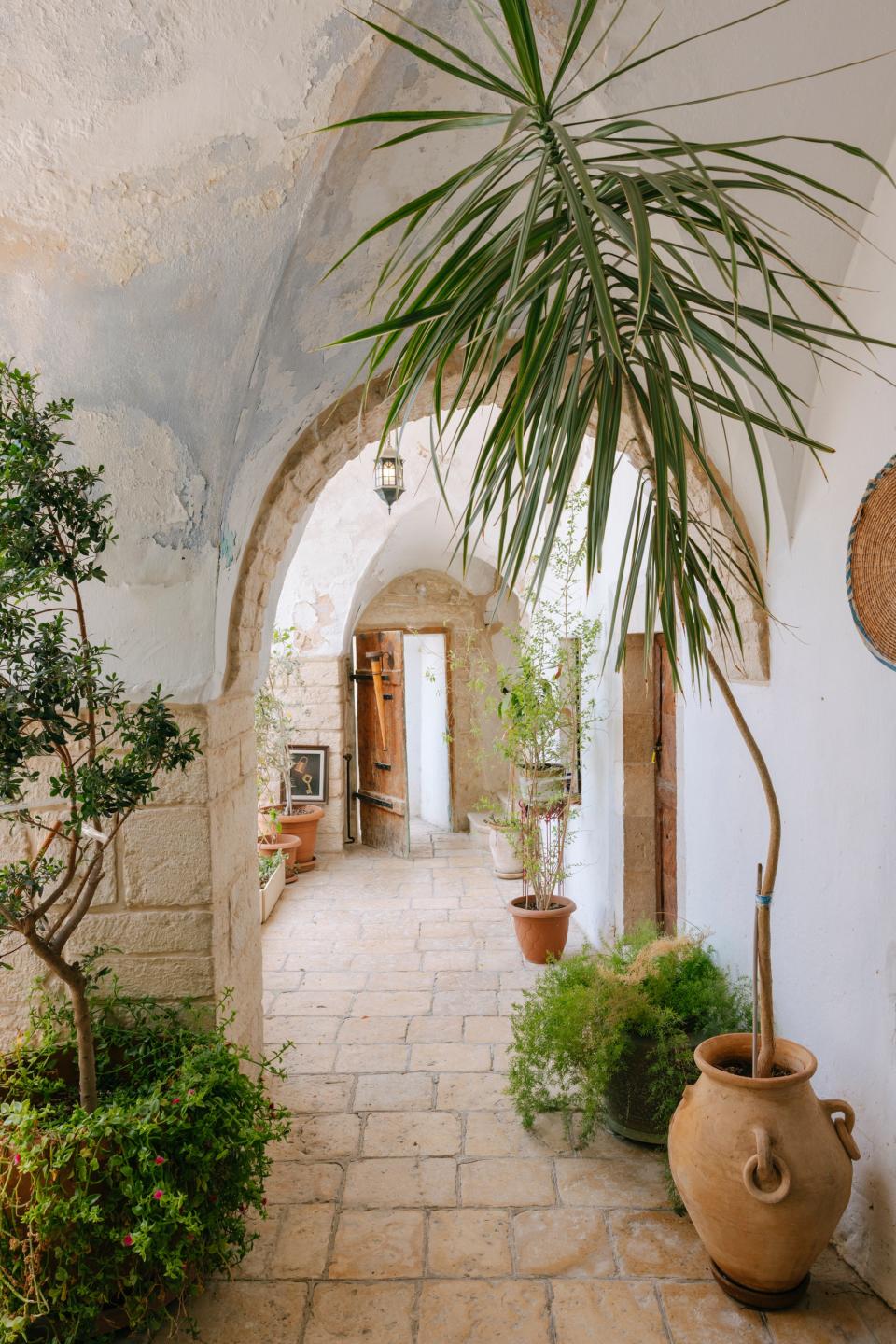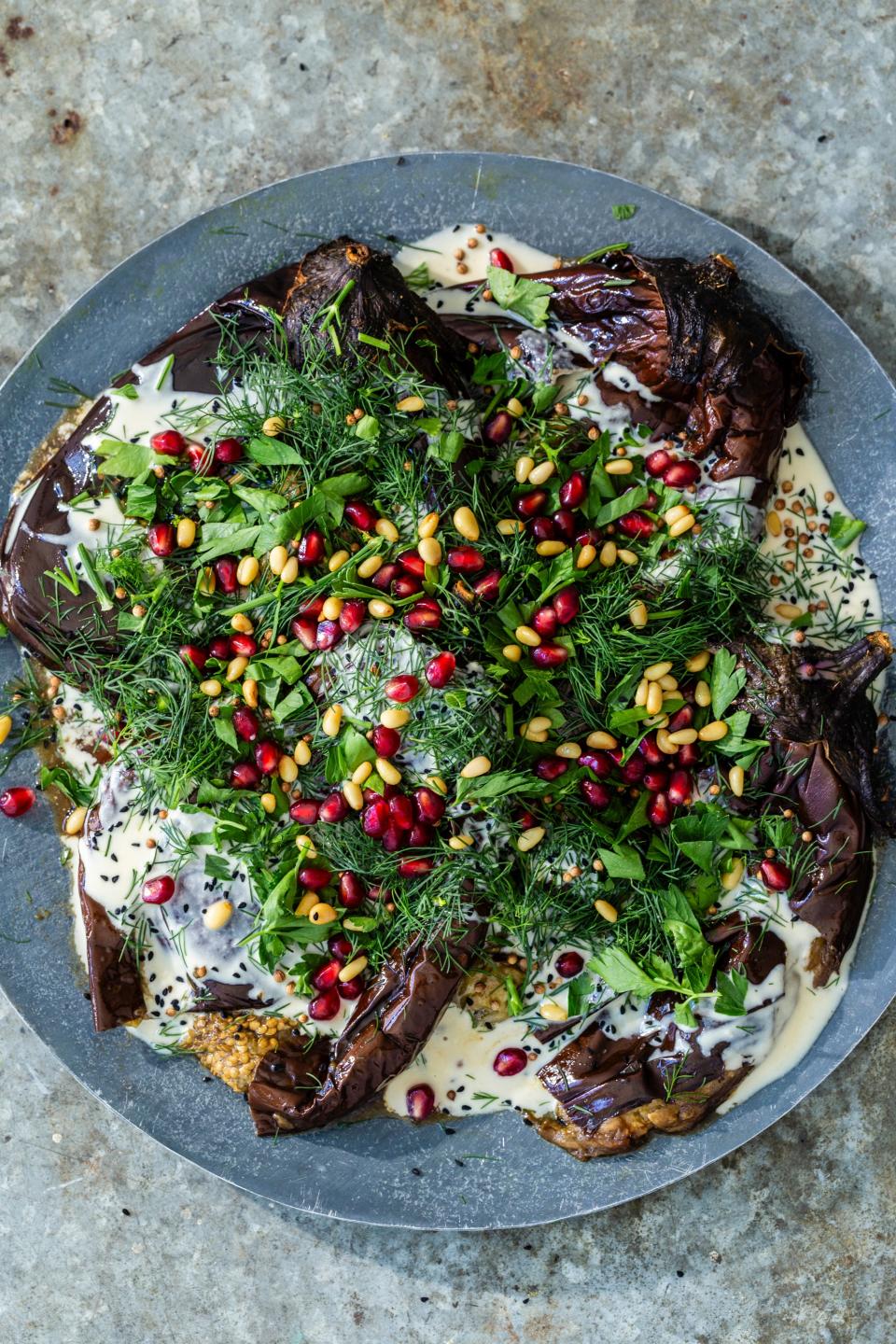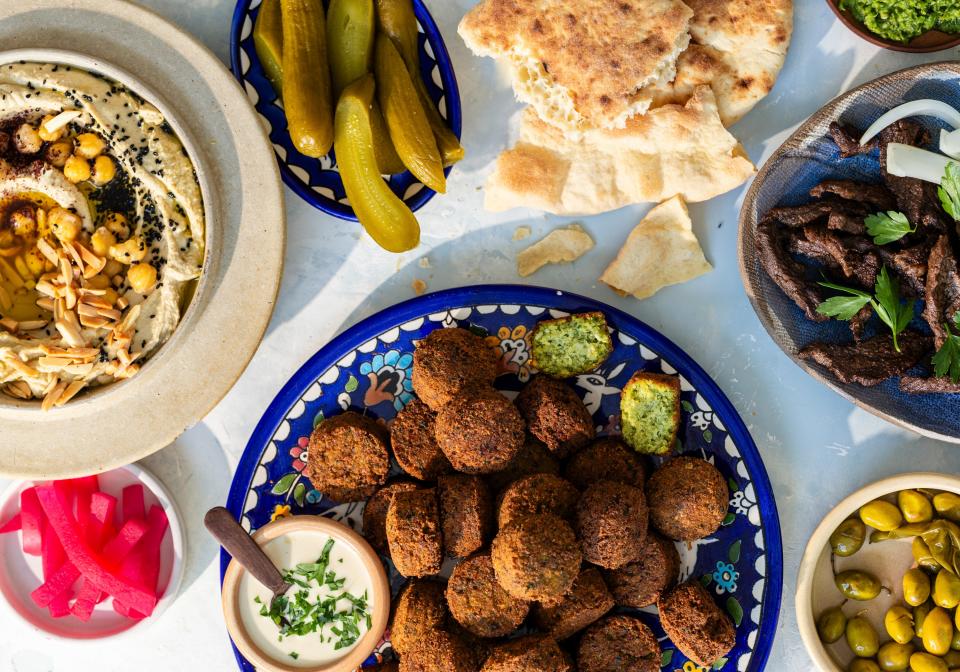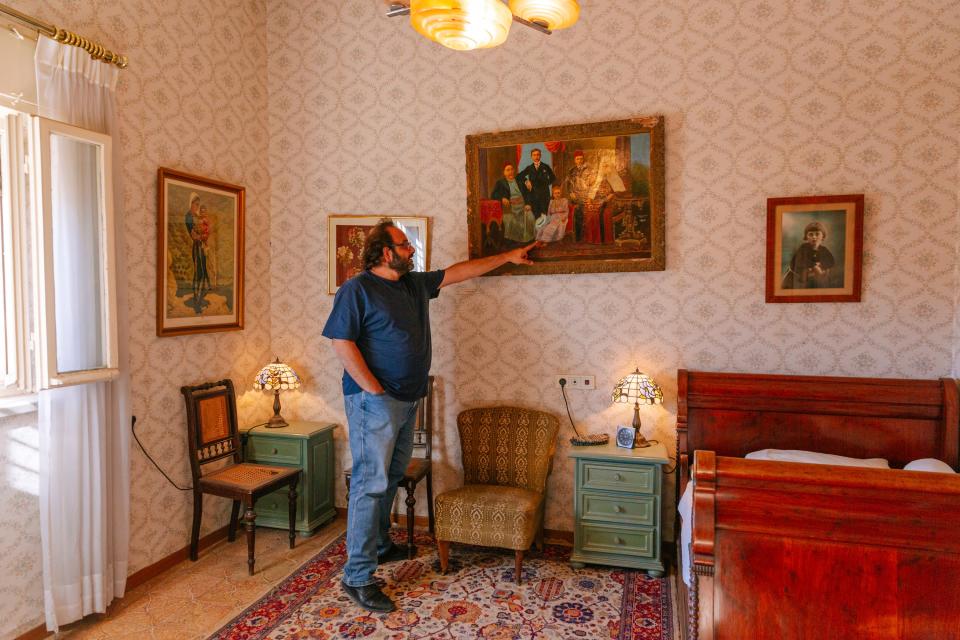In His New Cookbook, Palestinian Chef Fadi Kattan Honors the Flavors of the West Bank

Franco-Palestinian chef and hotelier Fadi Kattan, who splits his time between projects in London and the West Bank, can now add author to his repertoire. His new cookbook, Bethlehem: A Celebration of Palestinian Food, set to be released on May 14 in the US, honors his hometown and its people. In a devastating time for Palestinians, as a violent assault pushes surviving Gazans to the brink of famine and impacts life for those in the West Bank every day, Kattan's book aims to bring Bethlehem into people’s kitchens to preserve the traditions, culture, and flavors of Palestine well beyond the region.

Bethlehem: A Celebration of Palestinian Food by Fadi Kattan
$40.00, Amazon
Work on the cookbook began back when Kattan, who completed an education in hospitality at Paris’s Institut Vatel, returned to his native Palestine in 2000, just before the Second Intifada. The chef, who had been working at the InterContinental Hotel in Bethlehem before it was shut down due to the uprising, was forced to shift gears and instead work alongside his businessman father selling kitchens for a period—and it was around this time that he noticed a gap between the colorful, flavor-spiked dishes that Bethlehemites were cooking in their homes and the international-leaning cuisine being served in the town’s restaurants. Inspired by his training in Paris, he set out to find a way to unite the two.
In 2016, Kattan founded Fawda restaurant in Bethlehem, which offers an elevated twist on Palestinian home cooking: tahini-rich hummus and lamb shanks braised in cardamom and fermented yogurt. Kassa Boutique Hotel, a boutique property on the UNESCO World Heritage site of Star Street, followed. And in early 2023, seeking to share the intangible magic of his heritage well beyond Palestine, Kattan co-founded Akub restaurant in London’s Notting Hill.
Here, Kattan discusses his beloved Bethlehem and its many corners of culinary inspiration, from the local markets and his favorite Palestinian spinach bread, to how the Palestinian struggle for ingredients in the West Bank impacts ingredients and home cooking.


Your debut cookbook, Bethlehem, feels like an ode to your hometown. Can you tell us more about it?
My upbringing and where I come from have always influenced everything I do. I wish I could capture the frenzy of a family lunch being prepared at our home in Bethlehem. I suppose that is what this book is: a translation of that feeling in the form of recipes that I can share with other people. My roots are reflected in the book and really, whether it’s a restaurant or a hotel or a book that I’m working on, I’m always telling the story of this beautiful land.
I want this book to feel as though I have taken you by the hand and walked with you to discover my Bethlehem. The recipes are portraits of the people that make up this place. I wanted to write a book without tiptoeing away from the political realities of the Israeli occupation, the injustices we endure as Palestinians, the Nakba of 1948. In the book, I talk about the story of my family's land in Jaffa being confiscated. I don't shy away from it. I am unapologetically Palestinian, I'm a proud Palestinian. Cooking is a form of resistance and existence. We are people who live in this land. We are people who grew from this land. Our food is from this land. And that is who we are.
You also come across as very outward looking, in the sense that you moved abroad to train, and then also founded a Palestinian restaurant in London…
That is a reflection of my hometown. Bethlehem may be small but it's very cosmopolitan and I enjoy that. Its people have traveled all over the world and settled across the world in many different countries. Just in my family I have 70-80 cousins who left Palestine and went to live elsewhere. Some of them were refugees after the 1948 Nakba. In Bethlehem there's an ongoing exchange between diasporas continuously coming back and going forth. All this brings a very dynamic exchange of culture and food. I'm so inspired by the places I eat in Bethlehem, from local falafel spots, to my butchers, to even eating at my aunts’ homes.
What about Palestinian food and the dishes you celebrate in your book? What are the flavors of home?
Palestinian food is distinctly Palestinian because it's inscribed in the terroir of Palestine. It's reflecting the land, reflecting the seasons, the very short seasons of every herb, every vegetable, every bit of produce. The scents and flavors of home that I’ve tried to include in the book are of my grandmothers and mother preparing food. The scent of olive oil, the frying of onion and garlic, or of meat being browned. Also, the fruity flavors that fill the air when my mother makes jams. She does the best jams in the world. When I think of Palestinian food I also think about the dishes we eat during celebrations, like the pork- and- ham-flavored with cloves that we make at Christmas, my grandmother’s eggs with za’atar, or the scent of lamb roasting on the barbecue.
When you build a building, there's a tradition that you sacrifice a lamb and the meat is given to people of poorer background. I have a memory of us doing the same at my grandparents home with the workers who built it. I remember sitting on the floor with them, eating mansaf with our hands, sharing a meal in celebration of this new house.

Which parts of your hometown are you keen to share with others?
There are a lot of unknown places that are common for the people of the city. People come to Bethlehem to visit the Church of the Nativity, but I want them to be able to spend a few nights stay at Kassa, the boutique hotel I launched with a beautiful enclosed courtyard that I have a soft spot for. I encourage visitors to meet the people that are there in my book, to smell the smell of fresh za’atar as they stroll down the street in the morning. To walk into the spice shop and discover what fenugreek is or to go to the Arab Women’s Union that my grandmother was one of the founders of and buy some of these delicious spinach breads to eat while exploring the town.
I love the Old City market, which is just a few minutes away from where I live in my grandparents’ old home. It’s the only market in Bethlehem, and that's where all the artisans that I wrote about in my book are selling their produce. There’s Nabil, the lady who sells the herbs and spices, the butchers, the bakers. To me, it’s one of the most special places because it gives a sense of the vibrancy of us Palestinians, but also our challenges. A lot of the farmers come from villages [nearby] and since the Israelis built the bypass roads with checkpoints and the settlements, it's much more complicated for people to arrive at the market every day. You feel a sense of resilience in people there.

Living in Bethlehem and owning a restaurant there must come with its own challenges?
The challenges really affect how we eat and what we eat. Bethlehem is surrounded on two sides by a [40-foot-high] concrete wall and barbed, electric wire fences. In the Muslim area, there are now twenty-three Israeli settlements that are growing on a daily basis. According to international law, they’ve been built illegally on land that has been stolen from Palestinians. Israel has full control of water in the West Bank, which they then sell back to Palestinians. By Israeli law, Palestinians are not allowed to use certain roads, which makes the whole supply of vegetables and fruits extremely complicated. Foragers have disappeared more and more because the Israeli authorities have made picking Za’atar over a certain quantity illegal, and a lot of the olive groves have disappeared because of the settlements, too. I have dreams about being able to pick one of my own oranges from my family's land.
Can you share something interesting about Bethlehem that not many people know about?
Bethlehem for me is the town as well as the villages and landscapes around it, even though they've drastically changed over the years. The old city was rebuilt during the Ottoman Empire, but in the 1830s there was an earthquake in Bethlehem which demolished much of the architecture. What's very interesting is a lot had been rebuilt after the earthquake with the stones of the previous construction so we ended up with these fabulous looking homes. Many of the homes around the center of the Old City were built by families who were in trade and therefore they traveled, which influenced the architecture. We have these fine, majestic stone constructions because, even today, in Bethlehem you can only build with stone. It gives the city a very noble presence. Its houses and public buildings are really special.
Originally Appeared on Condé Nast Traveler

